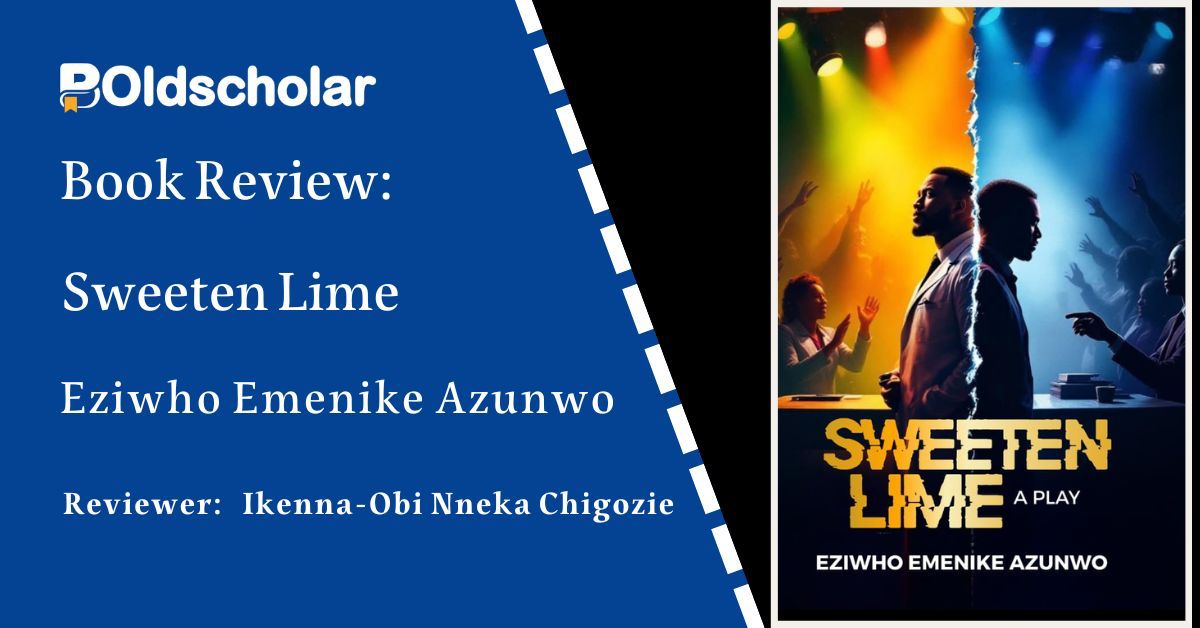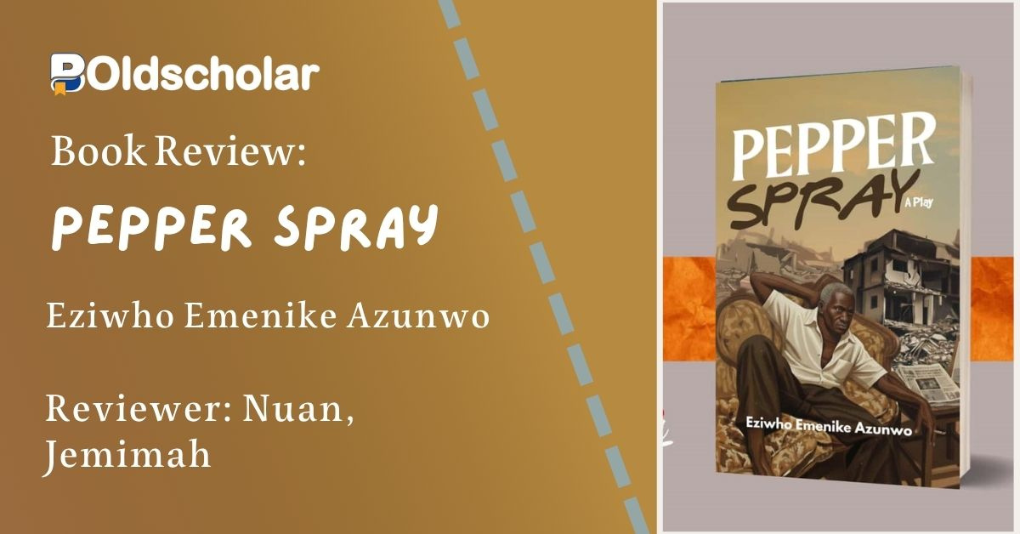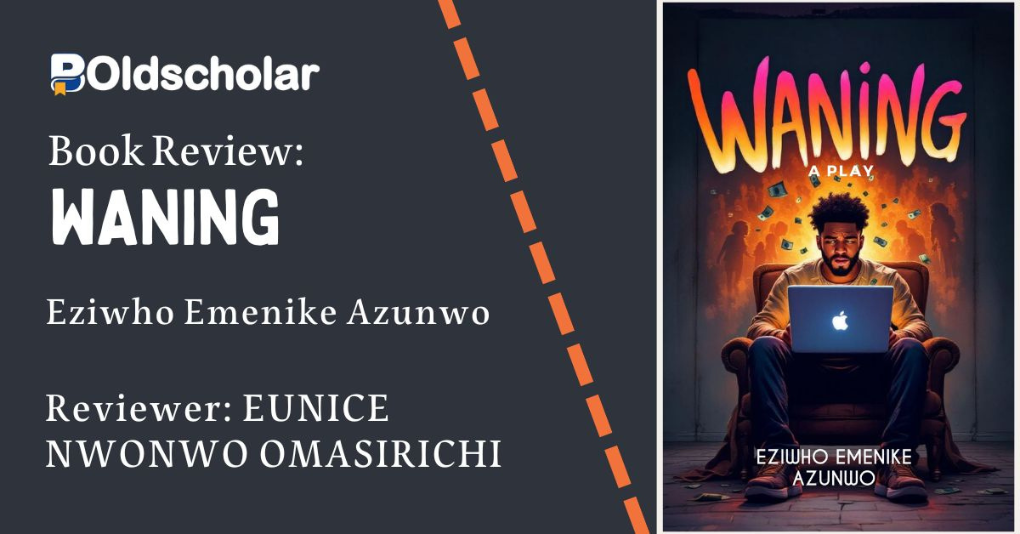Title: Politrickians
Genre: Play
Author: Eziwho Emenike Azunwo
Year of Publication: 2025
Publisher: Covenant Daystar Publishers, Port Harcourt. Nigeria
Pagination: (Number of pages) 60 pages
Reviewer: Ikenna-Obi Nneka Chigozie
Institution: Rivers State University, Port Harcourt, Department of Theatre and Film Studies
Introduction
Eziwho Emenike Azunwo’s Politrickcians is a compelling work of political theatre that fuses satire, social criticism, and tragic realism to expose the deep fractures within Nigeria’s democratic framework. Set in the fictional yet symbolically representative Bakanin State, the play probes the nation’s post-independence disillusionment through sharp dialogue, irony, and scenes that reflect a society in moral decline. Azunwo (2025) critiques the manipulation of political systems by self-serving elites who exploit power through spectacle and tribal sentiment. The very title, Politrickcians, underscores this critique—an intentional distortion of “politicians” that highlights deception as the modus operandi of leadership in postcolonial Nigeria.
The characters serve as embodiments of various social responses to this reality. Ubuoye, the central voice of resistance, delivers a biting comparison: “Pastors and politrickcians—same skill. They wear people’s minds like socks” (Azunwo, 2025, p. 18). Here, Azunwo draws attention to the performative similarities between religious and political leadership—both manipulating public perception under the guise of service. The political rally, ostensibly a celebration of civic life, is portrayed instead as a stage-managed performance devoid of genuine engagement. Carmango cynically observes, “Politics no be play. Na serious thing” (Azunwo, 2025, p. 26), exposing the tragic irony that politics, while treated theatrically by its actors, has devastating real-world consequences for the people.
Ethnic tension—one of Nigeria’s enduring post-independence legacies—is explored through the disturbing presence of a tribalistic police officer, who reduces the characters to ethnic stereotypes. “Easterners—your hard heads ruined this nation,” he declares (Azunwo, 2025, p. 23), illustrating how institutional authority reinforces ethnic prejudice. Ubuoye’s defiance challenges this systemic bias: “Are you even a real policeman, or are you just wearing the uniform to execute your tribal agenda?” (Azunwo, 2025, p. 31). This moment reflects the playwright’s interrogation of power and identity—calling attention to how uniformed officers often serve personal or political interests rather than justice.
The play reaches its tragic climax when His Excellency, the unnamed but archetypal leader, incites the crowd with inflammatory rhetoric against the eastern region: “That’s my problem with people from the East… They’re stubborn, they’re betrayers, and they lack respect” (Azunwo, 2025, p. 54). Unable to tolerate the hate speech, Ubuoye reacts impulsively by hurling a stone at the speaker. The consequences are immediate and catastrophic. The police officer, acting as both judge and executioner, shouts, “He must die!!” (Azunwo, 2025, p. 59), triggering the crowd’s violent frenzy: “We must burn them! We must burn them!” (Azunwo, 2025, p. 60). This mirrors the earlier extrajudicial killing of Abiye for stealing garri, thus reinforcing the recurring theme of mob justice and collective moral failure.
In conclusion, Politrickcians transcends the stage to function as a powerful socio-political commentary. Azunwo positions the theatre not only as a space for performance but as a mirror to society. As he declares in the author’s note, “This is not just a story for the stage. It is a warning. A question. A plea” (Azunwo, 2025, p. 7). Through its plot and characters, the play compels audiences to reckon with the systemic failures and everyday complicities that sustain Nigeria’s political dysfunction.
Plot Structure
Exposition: Laying the Foundations of Satire and Social Decay
The play opens amidst the bustling and symbolic setting of the Action People Congress (APC) national convention in Bakanin State—a thinly veiled representation of contemporary Nigeria. Azunwo introduces the central characters—Ubuoye, Carmango, and Honorable—as they loiter at the edges of the political gathering. Their early conversation is both casual and chilling, revealing the moral degradation of a society where extrajudicial killings are normalized.
CARMANGO: “The boy stole garri. They didn’t waste time—put a tire round his neck like a necklace.”
UBUOYE: “The sun was hot. They cooled him off—with fire.” (p. 12)
This introductory moment sets the thematic tone of the play—a critique of state failure and mob justice, where the poor are swiftly punished, and the powerful remain unaccountable. The political event is not just a backdrop but a metaphor for the performative nature of Nigerian democracy, where slogans and spectacle replace substance.
Rising Action: Exposing Ethnic Hatred, State Complicity, and Social Desperation
Tension builds as tribalism and authoritarian control surface through the character of the Police Officer, who interrogates the trio based on their ethnic origins. His vitriolic statements expose how ethnicity is weaponized by state institutions:
POLICE OFFICER: “Easterners—your hard heads ruined this nation.” (p. 23)
Ubuoye’s reply challenges the façade of law and order:
UBUOYE: “Are you even a real policeman, or are you just wearing the uniform to execute your tribal agenda?” (p. 31)
These interactions highlight how state authority often conceals personal prejudice, reinforcing systemic injustice under the guise of national unity. The narrative also brings poverty to the fore through the Old Man, who reveals that survival often demands masquerading as political allegiance:
OLD MAN: “I wear this so security won’t chase me away… Everyone’s trying to eat, and everyone’s trying to stop others from eating.” (p. 33)
Here, the playwright underscores the desperation of the common citizen, manipulated by hunger and rendered voiceless by a system that commodifies loyalty.
Climax: A Stone Against Tyranny
The dramatic and emotional climax unfolds with the grand entrance of His Excellency, a figure of political spectacle whose oratory is marked by dangerous rhetoric. He delivers a hate-filled speech that targets the Eastern region:
HIS EXCELLENCY: “That’s my problem with people from the East… They’re stubborn, they’re betrayers, and they lack respect.” (p. 54)
This inflammatory language triggers Ubuoye—already humiliated and racially profiled—into an impulsive act of rebellion:
“A stone strikes HIS EXCELLENCY on the forehead… They find the culprit—it’s UBUOYE.” (p. 58)
The scene escalates swiftly into chaos. The crowd, once cheering, now becomes a frenzied mob incited by state actors:
POLICE OFFICER: “He must die!!”
CROWD (Chanting): “We must burn them! We must burn them!” (p. 60)
This turning point reflects how easily public adoration can be converted into violence, and how the machinery of state and public opinion conspire to crush dissent.
Falling Action: Collective Betrayal and the Death of Conscience
As Ubuoye is violently attacked, Honorable and Carmango attempt to intervene but are also beaten. The tragedy evokes the earlier story of Abiye, suggesting that history is repeating itself. In one of the most emotional scenes, Ubuoye’s mother and Abiye’s mother plead for his life:
UBUOYE’S MOTHER & ABIYE’S MOTHER (Wailing): “Please! Please! He’s just a boy!” (p. 60)
Their cries fall on deaf ears, mirroring the silence and complicity of a society conditioned to obey authority, even at the cost of justice. The frenzy of the mob becomes a metaphor for a nation where conscience has been replaced by propaganda, hunger, and fear.
Denouement: Darkness, Dissonance, and Death
The play concludes with Ubuoye and his companions being dragged offstage amidst intensifying drumming and growing chaos:
“The chaos continues as the drummers beat louder and faster. The lights slowly fade to black.” (p. 60)
There is no redemption, no justice—only a descent into symbolic darkness, underscoring the irreversible damage wrought by a society that has lost its moral compass. The silence that follows is not peace but the absence of dissent, and the return to business as usual in a nation ruled by fear, spectacle, and betrayal.
Tragic Repetition and the Theatre of Power
The structure of Politrickcians—from satirical exposition to tragic catastrophe—mirrors the cyclical and unresolved nature of Nigeria’s political crises. Azunwo’s characters embody both resistance and resignation, and their fates dramatize the fragile line between protest and punishment. The play’s tragic arc not only reflects the failure of leadership but also implicates the masses in sustaining the very systems that oppress them.
As Azunwo poignantly writes in his author’s note:
“This is not just a story for the stage. It is a warning. A question. A plea.” (p. 7)
Indeed, Politrickcians compels its audience to confront the uncomfortable truth that in the theatre of politics, silence can be deadlier than action, and the price of complicity is often paid in blood.
Character and Characterization
Characterization in Politrickcians is crafted with both realism and symbolic resonance. The characters emerge as authentic figures shaped by a politically volatile environment, yet they also serve as archetypes representing the wider Nigerian condition. Through the use of satirical dialogue, conflicting perspectives, and emotionally charged interactions, Eziwho Emenike Azunwo constructs a dramatic landscape that mirrors the complexities of post-independence Nigeria—marked by fractured national identity, entrenched tribal divisions, manipulative politics, and the pervasive struggle for survival.
Ubuoye emerges as both the moral center and tragic figure of the play. He is portrayed as intelligent, courageous, and acutely conscious of the socio-political contradictions that define contemporary Nigerian life. His willingness to challenge authority and speak out against tribal bigotry positions him as a symbol of resistance. What distinguishes Ubuoye most is his unwavering refusal to remain silent in the face of injustice—even when doing so places his life at risk.
When the Police Officer accuses Easterners of ruining the country, Ubuoye responds with biting defiance:
UBUOYE: “Are you even a real policeman, or are you just wearing the uniform to execute your tribal agenda?” (p. 31)
He represents the youthful idealism crushed by the weight of systemic oppression, and ultimately, he becomes the sacrificial scapegoat for daring to speak truth to power. His final act of protest—throwing a stone at His Excellency—is both symbolic and literal, a desperate gesture of defiance against a corrupt order:
“A stone strikes HIS EXCELLENCY on the forehead… They find the culprit—it’s UBUOYE.” (p. 58)
Carmango – The Disillusioned Observer and Voice of Pragmatism
Carmango is depicted as a cautious, witty, and perceptive character whose streetwise demeanor often softens tense moments through humor and colloquial insight. While he recognizes the charade that defines Nigerian politics, he lacks the boldness to confront it directly, unlike Ubuoye. His role within the play is to embody the disillusioned yet passive citizen—one who sees through the deception but is too wary of the consequences to act.
His critical awareness is revealed early in the play when he remarks:
CARMANGO: “Politics no be play. Na serious thing.” (p. 26)
This line encapsulates his understanding of the dangerous seriousness behind the theatrical displays of political life. Yet, despite his clarity, Carmango consistently avoids direct confrontation—a trait that reflects the mindset of many ordinary Nigerians who, while aware of systemic injustice, opt for survival over activism.
Throughout the play, Carmango offers sharp commentary on political hypocrisy, class-based injustice, and ethnic tensions. His role as a choric commentator positions him as a reflective conscience—always alert, but ultimately restrained by fear and resignation.
Honorable – The Satirical Commentator and Passive Conformist
Honorable functions as both a source of comic relief and a subtle embodiment of passive complicity. His name—“Honorable”—is deliberately ironic, evoking the image of a respectable public servant, yet he consistently demonstrates neither moral leadership nor ethical resolve. Instead, he typifies the segment of society that recognizes political dysfunction but chooses to adapt rather than resist.
His sharp wit and sarcasm often punctuate serious moments with humor, as seen when he critiques the bombastic and divisive rhetoric of His Excellency:
HONORABLE: “What I’m yet to see is His Excellency speak with intelligence. His speech is as rough as a tout’s—no finesse, no class.” (p. 40)
Though he voices disapproval, Honorable remains firmly on the sidelines. He never confronts the system he ridicules, and his biting commentary conceals a deep resignation. As such, he represents the apathetic bystander—critical of power yet unwilling to challenge it—whose silence and inaction ultimately help sustain the very structures he mocks.
His Excellency – The Charismatic Tyrant and Master of Spectacle
His Excellency stands as a composite figure—a satirical portrayal of the archetypal Nigerian big-man politician. Boisterous, manipulative, and deeply tribalistic, he sustains his power through a mix of mass adulation and fear. His rhetoric is performative and incendiary, stirring both pity and revulsion.
He confidently stokes ethnic animosity:
HIS EXCELLENCY: “That’s my problem with people from the East… They’re stubborn, they’re betrayers, and they lack respect.” (p. 54)
His dominance is reinforced through call-and-response theatrics, skillfully controlling the crowd with rhythmic chants:
HIS EXCELLENCY: “Aryi and his Eastern brothers need what?”
CROWD: “Some spanking!” (p. 55)
More than just an individual, His Excellency is a metaphor for entrenched ethnopolitical control—a performer whose authority relies on illusion, intimidation, and calculated generosity.
The Police Officer – State Power as Ethnic Weapon
The Police Officer embodies institutionalized brutality intertwined with tribal bias. He represents the Nigerian state’s coercive force used not for protection but for oppression—especially targeting minorities and dissenters.
His blatant tribalism surfaces in his harsh dismissal:
POLICE OFFICER: “Easterners—your hard heads ruined this nation.” (p. 23)
Quick to violence, he incites the crowd to enact vigilante justice without due process:
POLICE OFFICER: “He must die!!” (p. 59)
Through this figure, Azunwo exposes how law enforcement can transform into a tool of ethnic cleansing and political violence.
The Mothers – Maternal Figures Torn Between Hunger and Honor
Ubuoye’s and Abiye’s mothers serve as emotional pillars in the narrative. They symbolize the typical Nigerian mother—grieving, impoverished, yet compelled to endure humiliations for survival. Their behavior is paradoxical: mourning their children’s deaths while eagerly scrambling for money handed out by the very politicians responsible for their plight.
U. MOTHER: “Never reject free money! Do you hear me? Never!” (p. 44)
Portrayed with both empathy and irony, they are victims of hunger yet unwilling participants in sustaining a corrupt system. Their contradictions reflect the broader theme of complicity born of desperation.
The Old Man – The Disguised Beggar and Symbol of Decay
The Old Man introduces a quiet note of tragedy and deception. Donning a party shirt to blend with the crowd, he begs under the guise of safety. His speech carries a poetic, despairing tone:
OLD MAN: “I wear this so security won’t chase me away… I heard about the rally and came early to secure a spot.” (p. 33)
Though initially evoking pity, he is ultimately revealed as a pickpocket—highlighting how survival often compromises morality. His character blurs the line between victim and exploiter.
Character as Political Allegory
In Politrickcians, Azunwo uses characterization to reflect Nigeria’s fractured socio-political landscape. Each character transcends mere drama to become an allegorical figure: Ubuoye as the silenced truth-teller, Carmango the incapacitated thinker, Honorable the indifferent elite, His Excellency the autocratic populist, and the Police Officer as the embodiment of state-sanctioned hatred.
Together, they construct a world where satire intertwines with tragedy, and individual destinies mirror the nation’s larger story of betrayal, silence, and survival. The playwright’s voice issues a solemn reminder:
“This is not just a story for the stage. It is a warning. A question. A plea.” (p. 7)
Thematic Concerns in Politrickcians
Azunwo’s Politrickcians delves deeply into themes that reflect the complexities and contradictions of Nigeria’s political and social landscape:
The play foregrounds how ethnic divisions are exploited for political gain. His Excellency’s provocative statements reveal this strategy:
“That’s my problem with people from the East… They’re stubborn, they’re betrayers, and they lack respect.” (p. 54)
Similarly, the Police Officer’s tribal bias fuels discrimination and scapegoating:
“Easterners—your hard heads ruined this nation.” (p. 23)
Together, these voices illustrate how tribalism underpins conflict and consolidates power through fear and hatred.
Institutional brutality emerges as a key theme, embodied in the Police Officer’s role as an agent of oppressive state power. His incitement to violence—“He must die!!” (p. 59)—exposes the state’s readiness to suppress dissent through extrajudicial means, showing law enforcement as a tool of intimidation rather than justice.
The Mothers symbolize the harsh realities faced by ordinary Nigerians struggling between dignity and desperation. Their pragmatic acceptance of corrupt patronage—“Never reject free money! Do you hear me? Never!” (p. 44)—captures the painful compromises people make to survive in a system that exploits their vulnerability.
Power is portrayed as a theatrical spectacle, especially through His Excellency’s manipulative public displays and the Old Man’s disguise:
“I wear this so security won’t chase me away… I heard about the rally and came early to secure a spot.” (p. 33)
These performances reveal how survival often requires masking truth and morality, blurring lines between victim and perpetrator.
Collectively, the characters represent fractured aspects of Nigeria’s fractured socio-political identity. The play’s closing words—“This is not just a story for the stage. It is a warning. A question. A plea.” (p. 7)—call for urgent reflection on betrayal, silence, and the struggle to survive within a divided nation.
Conclusion
In Politrickcians, Eziwho Emenike Azunwo presents a searing political satire where characters are not merely individuals but intricate symbols of Nigeria’s fractured socio-political reality. Through dramatic characterization, Azunwo constructs a theatrical landscape that holds a mirror to a nation marred by ethnopolitical manipulation, institutional violence, moral compromise, and societal disillusionment.
His Excellency, portrayed as “the Charismatic Tyrant and Master of Spectacle,” embodies the archetype of the manipulative Nigerian politician who governs not through vision or integrity, but through spectacle, fear, and divisive rhetoric. His incendiary remark—“That’s my problem with people from the East… They’re stubborn, they’re betrayers, and they lack respect.” (p. 54)—is a potent example of how ethnic stereotyping is weaponized to inflame division and consolidate personal power. His theatrics, such as the choreographed call-and-response—“Aryi and his Eastern brothers need what?” CROWD: ‘Some spanking!’ (p. 55)—depict a grotesque parody of political rallies, where public discourse is reduced to crowd manipulation and spectacle.
The Police Officer, on the other hand, is a stark representation of state power turned against its own people. He operates not as a custodian of justice, but as an enforcer of state-sponsored ethnic hatred. His blunt condemnation—“Easterners—your hard heads ruined this nation.” (p. 23)—followed by his bloodthirsty declaration—“He must die!!” (p. 59)—shows how law enforcement becomes a brutal instrument of political cleansing. Through him, Azunwo critiques the Nigerian state’s complicity in using tribalism to justify violence and suppress dissent.
The maternal figures—Ubuoye’s mother and Abiye’s mother—add a layer of tragic humanity to the narrative. They are complex symbols of endurance and desperation, caught between maternal grief and the pull of economic survival. Their lamentations are juxtaposed with ironic pragmatism, as captured in the line—“Never reject free money! Do you hear me? Never!” (p. 44). These mothers, though victims, are not absolved of complicity. They reflect the tragic irony of a populace forced to uphold the very structures that oppress them, driven by poverty and powerlessness.
Equally poignant is the Old Man, a character who wears a political party shirt not out of allegiance, but as camouflage—“I wear this so security won’t chase me away… I heard about the rally and came early to secure a spot.” (p. 33). His subtle disguise reveals the quiet desperation of survival in a society where appearances can grant access to safety and resources. Yet, his eventual exposure as a pickpocket blurs the line between victimhood and exploitation, suggesting that under a corrupt system, even the powerless may adopt deceit as a means of subsistence.
Collectively, these characters form a powerful allegory. Each one represents a facet of Nigeria’s political and social decay: Ubuoye as the silenced truth-teller, Carmango as the impotent intellectual, the Honorable as the aloof political elite, His Excellency as the embodiment of tyrannical populism, and the Police Officer as the state’s violent enforcer. The narrative structure fuses satire with pathos, holding space for both ridicule and mourning.
Azunwo’s final message, delivered through the voice of the playwright—“This is not just a story for the stage. It is a warning. A question. A plea.” (p. 7)—underscores the urgency of reflection and the demand for collective reckoning. Politrickcians is thus more than a play; it is a theatrical manifesto that exposes the dangers of silence, complicity, and ethnopolitical manipulation. It compels its audience to interrogate not just the systems of governance, but also the societal behaviors that enable tyranny to thrive.
References
Azunwo, E. E. (2023). Politrickcians: A play. Port Harcourt: Pearl Publishers.
Hornby, A. S. (2010). Oxford advanced learner’s dictionary (8th ed.). Oxford University Press.
Okoh, N. (2009). Politics and aesthetics: Essays on drama, theatre and performance. Ibadan: Kraft Books.
Osofisan, F. (2001). Insidious treasons: Drama in a postcolonial state. Ibadan: Opon Ifa sReaders.
Soyinka, W. (1976). Myth, literature and the African world. Cambridge University Press.
Share this post





Be the first to comment on this post